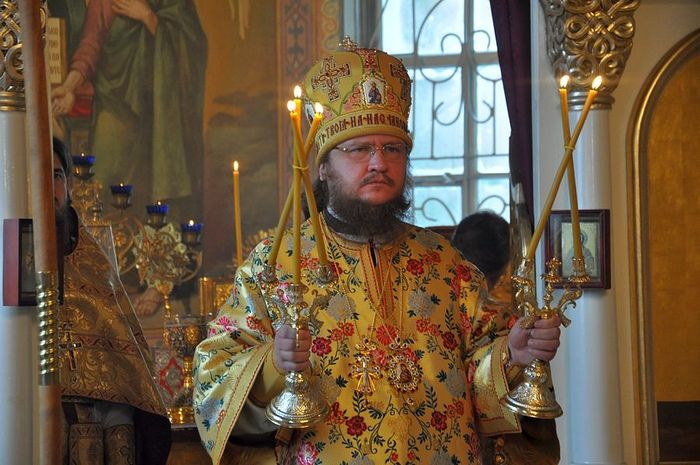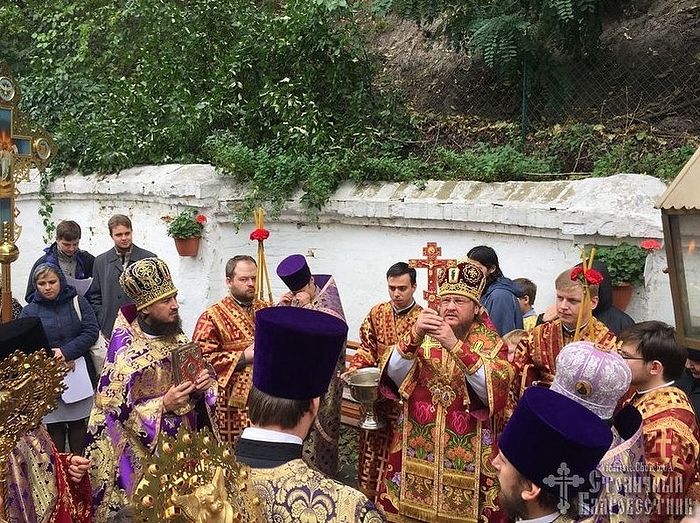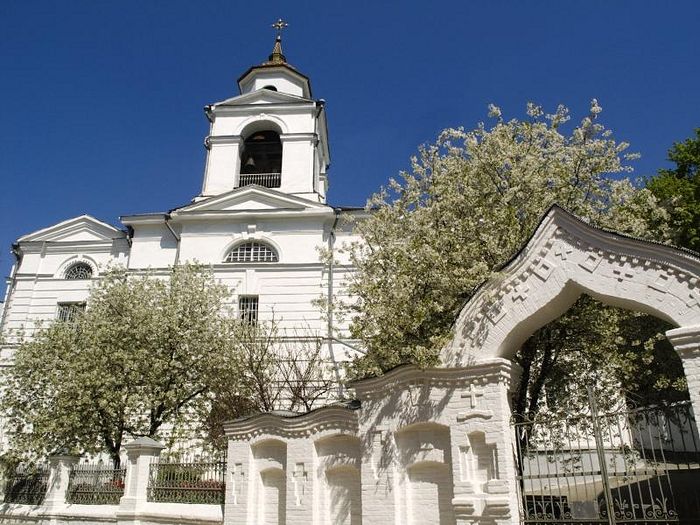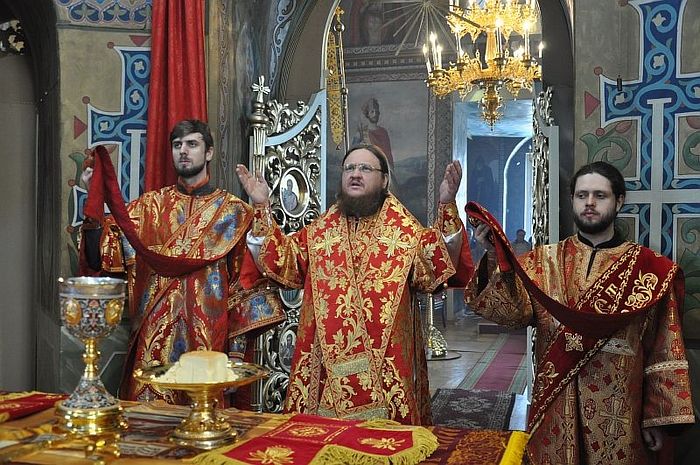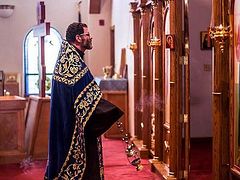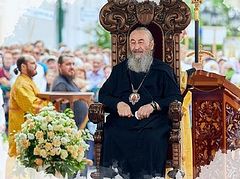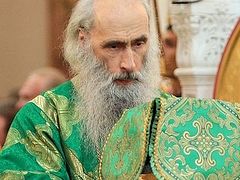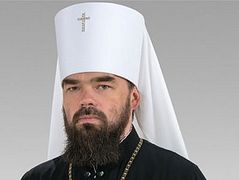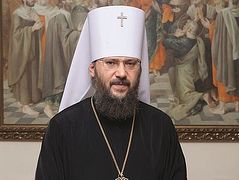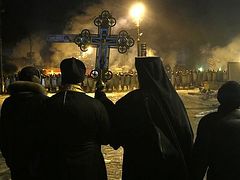A Vicar of the Kiev Metropolia, Archbishop Theodosy (Snigiryov) of Boyarka, during his Sunday homily, gave spiritual advice on the right attitude for the current situation in the Orthodox life of Ukraine, to the parishioners of the Church of the Exaltation of the Holy Cross in Kiev on October 21, 2018.
Dear Brothers and Sisters!
Today believers are greatly troubled. How should we present ourselves today, and how can we properly perceive these events? What can be done?
Firstly, all believers of the Ukrainian Orthodox Church, the canonical Orthodox Church, must understand and firmly know the following: Nothing in the church life of Ukraine has changed!
The Ukrainian Orthodox Church, as she was the only canonical Church conveying grace to her believers and all of Ukraine—thus she shall remain—the only grace-filled1 canonical Church of Ukraine.
Our Church carries out her service throughout Ukraine, even where the current authorities of Ukraine do not reach—in Crimea2 and the East of Ukraine3. The Ukrainian Orthodox Church is from Uzhhorod4 to Donetsk and Luhansk5, from Simferopol6 and Sevastopol7 to Sumy8 and Chernigov9—that is to say from East to West, from the North to the South—it is the largest, canonically solid, and certainly grace-filled Church of Ukraine.
We know that not long ago, our Ukrainian schismatics—a group of the former Metropolitan Philaret and the so-called UAOC received “legalization” from the Patriarch of Constantinople Bartholomew. What could this mean for us? For us this does not mean anything at all! And here is why:
The Orthodox Church lives by its own rules and canons, which we Orthodox people consider to be unshakable, we consider them a protecting wall for Orthodoxy. The canonical rules and laws were drawn up from the time of the Apostles and throughout the first millennium, and constitute the foundations of the Church. From time to time, various church formations depart from the Orthodox Church, falling into schism. Sometimes this schism is for the long-run, even millennial. Thus it once was with the Roman Orthodox Church—which for reasons not spiritual, but arrogant and political, violated the canons of Orthodoxy.
Rome was expelled from Ecumenical Orthodoxy and remained alone. So, the Roman Orthodox Church became the Roman Catholic Church. But in as much as it was the Church of Rome, and the second part of the Roman Empire, the Church of the Western World, which dynamically and civilizationally developed, it did not disappear in the peripeteia10 of history, but it survives today, and developed into a strong structure—the Roman Catholic Church, which was once one of the family of Orthodox Churches.
Something similar has come about, over the past hundred years, with the Church of Constantinople. Despite the fact that unlike the Roman Church of its time, the Patriarch of Constantinople is under difficult conditions11… in practical reality the Patriarchate of Constantinople doesn’t exist as a Local Church… the residence of the Patriarch is in Istanbul, on the territory of Turkey, where there is practically no Orthodox population. The title and position of Patriarch of Constantinople is in fact, symbolic.12 But nevertheless, the Orthodox world gave honor to the Patriarch of Constantinople throughout the centuries, even when Turks began to live and rule on his territory after the fall of Constantinople.
The problem is in that for the past 100 years, the Patriarchate of Constantinople has been following the same malignant path that Rome went on 1000 years ago—in violation of the canons and rules of the Church, in violation of the very spirit of Orthodoxy! In this case, that which is worldly began to be placed above that which is spiritual. The laws of human pride and secular power, understood by earthly reasoning, began to be placed above the canons of Orthodoxy.
If someone thinks that what happened today in Kiev with the Patriarch of Constantinople is something new, then this is not the case at all. The case, is in that the Patriarchate of Constantinople over the course of a century, in one form or another, took steps that were not characteristic of an Orthodox Patriarch.
The canons firmly state that no one Local Church, and not one bishop can step on a different territory with its own laws and canons, much less set up court there and make rulings. These are unshakable laws from the time of the Apostles, which the apostles observed and commanded their successors to observe. However, the Patriarchate of Constantinople in the last century has come out in many ways in defiance of them.
I will illustrate this with an example close to us, one hundred years ago. We are today speaking with you parishioners of the Kievan Church of the Exaltation of the Holy Cross13 [official church website here].
Many of us know that a famous writer, who became a classic, Mikhail Afanasievich Bulgakov, the son of a professor at the Kievan Theological Academy, was baptized in our Holy Cross church in Podil.
His family rented an apartment on Vozdvyzhens'ka14 street from the then-rector of the Church of the Exaltation of the Holy Cross. Mikhail Bulgakov was born here, he was baptized in our church. Those who read his works know that in our city, almost the same thing happened then, which is happening again today: the collision of the same ideas in the very same aggressive form.
Similar things happened in the ecclesiastical life. What happened with regards to the civil war, can be found in Bulgakovs novel “The White Guard”, and what happened ecclesiastically, was described in his feuilleton “Kiev city”15. I think that most of us [in this church—trans] are Kievans by birth, and Mikhail Bulgakov’s youth passed, most likely, like ours, in the flowering of chestnut trees16, in peace and prosperity.
And then suddenly, as Mikhail Bulgakov says, something happened in an instant, and everything went off the rails. He describes the church life of that time in this work.
In those days, the canonical Church was called the “old” Church, and were we called “Tikhonites” since Patriarch Tikhon of Moscow and All Rus’, whom we honor today among the Saints, was the Primate of the canonical Orthodox Church. And the revolutionary authorities in Moscow, Saint Petersburg, and Kiev created their own marginal schismatic entitied: “Renovationists”17 “Samosvyatov/Self-Consecrators”18 or “Lipkivty”19. And these “churches” were used by the authorities to fight the canonical Church, the “old church”, while the true believers were called “Tikhonites”.
Why am I taking this excursion into history? Because in the 1920s, the Patriarchate of Constantinople recognized the “Renovationists” as “the only legal church” on the territory of the Russian Orthodox Church, and called Saint Patriarch Tikhon “a person who brings confusing troubles into ecclesiastical life”. Isn’t it very similar to today’s realities?20
Remembering the events from 100 years ago, and such behavior of the Patriarch of Constantinople, we can already draw conclusions and understand in hindsight that the truth of God cannot be put to shame, the truth of God will always prevail—even when it seems that evil has conquered and overwhelmed all spheres of our life. When black is called white, and white is called black, and so certainly, that even our neighbors and friends, and sometimes we ourselves, think that black is actually almost white. When such clouds go over our hearts, one should never forget that the truth of God, sooner or later, will triumph.
Where are these renovationists today? Who remembers them? They were given practically all the churches, including the churches of our Kiev, but the few churches of the “old” confession, were filled with Believers—the “Tikhonites”, who wanted to receive communion, because they knew that Grace was present only in the true Church, and not among the “renovationists”, who were propped up by the revolutionary authorities.
It was that same time that Hieromartyr Vladimir Bogoyavlensky, Metropolitan of Kiev and Galicia was taken outside the walls of the Kiev Caves Lavra and shot at the instigation of the Samosvyat (self-ordained/self-consecrated) priests, the “independists” as they were called then. Where are they? No one remembers them. But Patriarch (Saint) Tikhon and Hieromartyr Vladimir are among the Saints, and the Church, which Patriarch Tikhon led shall exist until the final age, because “The gates of hell will not prevail against Her” (Matthew 16:18). Indeed, many believers of the Orthodox Church suffered, were in prison, or gave their lives for the faith, but the Church remained strong and true.
This great sorrow and lamentation, for the believing hearts of simple human beings, for our clergy and hierarchs, is caused by the fact that the Patriarchate of Constantinople again, 100 years later, has not ceased this strange behavior. For the majority of our believers, the first days after this decision were lived through in astonished perplexity, because after all, by canonical logic it just can’t happen…
But…it happened…
You know how it is sometimes when there are issues in a family with the father, for example a father who is an alcoholic, and the family tries to hide these problems, not to reveal them to anyone. When the family goes out among people, they make the father orderly, so that no one will realize he is a drinker. When receiving guests, they try to hide the vices of their father. But this is all before the time when the father crosses the red line, when he brings a prostitute or other alcoholics into the house.
Something similar to that has happened in our church life today. These are problems which arose due to those things which Constantinople has undertaken in the last 100 years, including when they recognized the “Renovationists”. Because after all, the Church was persecuted, Bishops were thrown into prisons, priests were shot, laypeople were thrown into concentration camps or labor camps. It was the most difficult time for our Church, and Constantinople just jumped on the persecutors’ bandwagon.
We did not talk about it, we were silent about all the problems which Constantinople created, we hid them in order not to air the dirty linens in public. Now we can no longer be silent.
Patriarch Sergius in the twentieth century said when Constantinople recognized the “Renovationists”, that “The Constantinople Patriarch’s communion with the renovationists can only make the Patriarch [of Constantinople] a renovationist, but it can’t make the renovationists Orthodox.”
The exact same thing is happening now: Philaret and his cohort did not become grace-filled due to him being “legalized” by Constantinople. It was the Constantinople itself, who brought itself out of the canonical realm, and called into question its continued place in the family of the Orthodox Churches; his authority in the Orthodox world is now under great doubt.
The time has come, perhaps, among us, when we must firmly stand up for the confession of our Faith, our Church, and we must understand perfectly that the Philaretites have not become grace-filled, and those among them who have a conscience are gradually beginning to return to the Church from the schism. This, for example, just happened one week ago in the Rivne21 Dioceses of the Ukrainian Orthodox Church.
One of Philaret’s so-called “priests” came to repentance22, and was ordained to the rank of deacon [in the canonical Church—Trans], because he understood that a priest cannot be a priest nor become a priest as a result of this decision of the Phanar, and that the schism continues to be a schism, the gracelessness continues to be gracelessness, and that the truth and the Grace of Christ [among the churches of Ukraine.—Trans] are only in our canonical Church.
In order to not lose the correct approach, and understand how to act during this complicated period in our ecclesiastical life, let us carefully listen and orient ourselves to the voice of our shepherd—the voice of His Beatitude Metropolitan Onufry.
This is a man of the holy life23 and of firm monastic constitution. The Lord placed Metropolitan Onufry as the head of the Ukrainian Orthodox Church—it was not simply for nothing! The Primate could have been chosen from any of the other Metropolitans—with other talents, but the Lord chose the Most Blessed Metropolitan Onuphry, as the person most solid, principled, and persevering.
Let’s listen to his voice, as the voice of our shepherd, and be firm in our hope; let’s listen to the voice of the Holy Synod of the Ukrainian Orthodox Church, the voice of the Bishops Council of the Ukrainian Orthodox Church, and if it gathers, of the entire Russian Orthodox Church, because our Ukrainian Orthodox Church is canonically located in the common heart of the Russian Church, as it has been since the time of the Baptism of Rus’.
And as for Patriarch Bartholomew and the Synod of Constantinople, who have come to the point that they may push our country and our Church not only to confession, but to persecution (who knows what might happen in our country)—we must pray that the Lord will enlighten them. When a person’s father stumbles [into sin], his family does not drive him away, but they pray for him, and they grieve for him. It also follows for us to grieve for these people who are pushing our Church into trials at such a difficult time. But we will hope that the Lord will not give us any trials above our powers to handle them…
Never forget that Kiev is one of the portions of the Most Holy Theotokos. The Mother of God chose it and under her care, under her mantle (omorphorion) the Kiev Caves Lavra has produced so many Venerable Fathers of the Kiev Caves, who are buried with incorruptible relics very close to us, in the ground on which we stand.
And this means that the Mother of God, we believe, will never abandon her portion; and if we are given a small time of bitterness, to labor hard and show forth our loyalty to God and the Church, then it will also be granted unto us, to greet those times, when we will once again be able to take a peaceful breath, when our churches will be filled with people with calm and not troubled thoughts.
And no longer will anyone threaten us—neither with violence, nor discrimination, nor with lies or slander, which now pours in abundance out of the media, and from the mouth of politicians, upon the heads of the faithful of the Ukrainian Orthodox Church.
Calling to remembrance the experience of the past hundred years, let us say: the truth of God will never be put to shame! Those who keep it will always be proven right—both in history and in eternity!
The Blessing of the Lord be with you!

